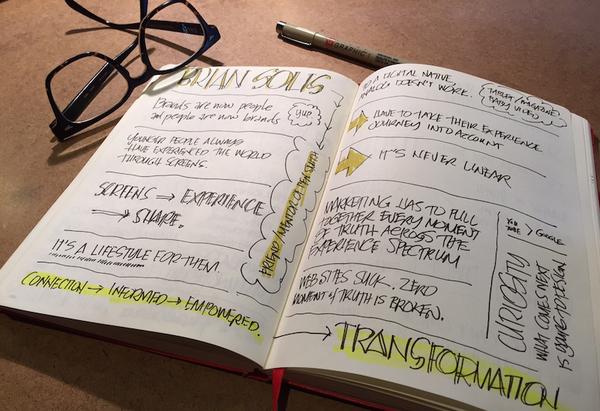via Eric Melin, CallahanCreek
With the overpopulation of channels, platforms, and devices in our connected world, it’s easy for marketers to get caught up in “the next big thing.”
We need to be on Snapchat! We should Periscope this!
What’s harder to figure out—because it requires rigorous, deep thinking about the divide between how your brand talks about itself and how people talk about your brand—is how to create culturally relevant, meaningful experiences for your customers.
Digital anthropologist and author Brian Solis called into Callahan Creek yesterday for an amazing lunch session to talk about how the role of marketing has changed. It was a fantastic discussion, and it invigorated our team of thinkers and makers to keep finding ways to innovate. When we talk about solving problems for brands, we’re talking about simplifying the customer experience in this world of connected consumerism.

Brian’s upcoming book, “X: The Experience When Business Meets Design,” is a blueprint for experience architecture. Brand architecture is one thing, but redesigning your brand’s experience architecture can elevate the role of marketing altogether.
Marketing has a tendency to get too narrowly boxed in. If we keep operating within the traditional paradigm, innovation becomes difficult. This means that both brands and marketers have to work together for a new kind of marketing—one that prioritizes the personal relationships people have with brands. These relationships are felt. Whether they are positive or negative, they are often shared.

One example of simplification and meaningful experience design is AirBNB’s “Snow White” storyboard process. Going beyond the website, they designed an experience roadmap for both the guest journey and the host journey. There were a lot of gaps and a lot of doubling up on concepts. The company streamlined the process on both sides, created new products, and simplified others to address specific problems and make the journey frictionless.
Startups are disruptors because they are competing for the customer right away by starting from scratch and creating experiences. To keep up, older companies must redesign from the ground up.
As Brian said today in our discussion: “Once you think about what you want people to feel and think and do at every stage, everything becomes more meaningful.”
Here’s a presentation where Brian Solis talks about how brands are defined by the experiences customers have with them—and how that journey is not solely on websites and landing pages:



Leave a Reply